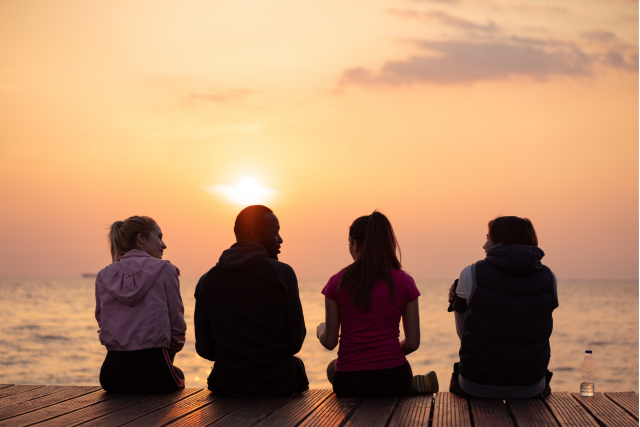Once a year, the calendar highlights a special day dedicated to a seemingly simple but profoundly impactful question: “R U Ok?” While it’s a question that warrants asking year-round, setting aside a designated day brings it to the forefront of public consciousness.
Also, this observance isn’t merely an opportunity to check in on others; it’s also a moment for contemplation, prompting each of us to take stock of our own well-being.
This concept of well-being struck me during a recent visit to my favourite primary school, St. Mary’s, for their History Week celebrations, where I had the chance to share, yet again, the memories and memorabilia I have from my time there.
I grew up in social housing until the age of 12 and came from a family that was far from affluent. Despite our financial constraints, my memories are not soiled by what we lacked but are filled with what we had.
I lovingly recall a warm home, readily available meals, and a lunchbox packed with nutritious treats like fruits and muesli bars.
And it didn’t stop there.
Sundays were extra special because my Dad would bring baked goods to Mum’s home from his workplace to fill our lunchboxes for the week ahead.
This routine gesture, combined with the small coins he would gather from his car for our pocket money, demonstrated love in a tangible form.
Family was a cornerstone in my upbringing.
My grandmothers regularly bought me clothes, and my aunts and uncles enabled fun and enriching experiences, fostering an environment of communal care.
Most inspiring was my mother, a single parent who studied tirelessly to improve her educational standing.
Starting at TAFE, she defied expectations by earning her Bachelor of Accounting and eventually earning a CPA.
This makes me ponder: did anyone ever ask her the question, “R U Ok?”
Some might view the circumstances of my youth as lacking, but through the lens of love and family support, I had all I could ever need.
Although I have mostly maintained a positive mindset throughout my life, I did confront a challenging period in 2016 and 2017 when I was diagnosed with ‘situational depression.’
A twelve-month course of medication aided my recovery, a testament to the value of seeking help.
When I return to St. Mary’s each year, the warm aura and vibrant culture reminds me of my gratitude for my foundational years there.
Those experiences were made possible by the sacrifices of my family, enabling me to attend a fee-paying school.
The buildings may have changed, and the teachers may have retired, but the lessons learned and the values instilled are lifelong.
As “R U Ok Day” dawns upon us, let us all remember that mental health is complex and unique to each individual.
From chemical imbalances to temporary struggles, the landscape is varied and often invisible to the naked eye.
Some people battle internal demons daily, and each step feels enormous.
So when you extend a helping hand, offer it freely and expect nothing in return.
Small acts of kindness can have a domino effect, sometimes changing—or even saving—a life. Though I’ve never had to live with a chronic mental illness, I’ve gained invaluable insights into the complexities of mental health by supporting loved ones, especially my sister, who recently faced a severe crisis and continues to walk her recovery journey.
Listening is the cornerstone of effective support.
As author Stephen Covey once said, “The biggest communication problem is we do not listen to understand; we listen to reply.”
Listen empathetically and without judgment.
Tailor your support to the individual’s needs; after all, mental health isn’t a one-size-fits-all issue.
If you don’t know what to do, it’s alright.
What’s crucial is directing them to appropriate resources or experts, and when in doubt, Lifeline is just a call away.
Remember, the proverb “It takes a village to raise a child” also applies to sustaining a healthy community.
Loneliness isn’t just an emotional state; it’s a public health issue.
As cited on the R U Ok Day website, companionship can make life’s journey much easier.
If you’re looking for further guidance on how to engage in meaningful “R U Ok” conversations, the organization’s website, www.ruok.org.au, offers a selection of resources.
If you find yourself needing support, remember: “Speak, even if your voice shakes,” as encouraged by Dolly’s Dream.
Your vulnerability might just become your strength, and your story could be the lifeline that someone else needs.








